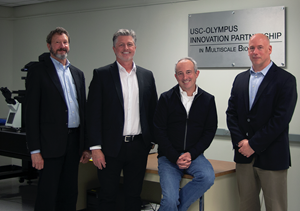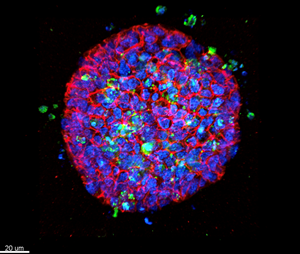The Future of Cancer Diagnostics and Treatment: New Partnership Bringing Transformation to Precision Cancer Medicine
USC-Olympus Innovation Partnership in Multiscale Bioimaging aims to improve cancer detection, prevention, and management
WALTHAM, Mass., Jan. 08, 2019 (GLOBE NEWSWIRE) -- The University of Southern California and Olympus have announced their first-ever co-development partnership with the goal of advancing multiscale research into cancer prevention, diagnosis, and treatment through precision medicine. The USC-Olympus Innovation Partnership in Multiscale Bioimaging demonstrates the clinical utility of new technologies that combine the workflow of a surgical biopsy and primary diagnosis with microscopic cellular and molecular characterization. The resulting personalized medicine and treatment selection will advance cancer research and potentially improve the precision of patient diagnosis and treatment.
The new USC-Olympus Innovation Partnership in Multiscale Bioimaging combines Olympus technology with the expertise of two renowned, university-wide institutes at USC, the Lawrence J. Ellison Institute for Transformative Medicine and the Translational Imaging Center (TIC). The Ellison Institute, named after a $200 million donation by Oracle founder Larry Ellison, aims to change the way cancer is treated and prevented by driving transdisciplinary, patient-centered, and nimble research programs with great promise to shape clinical care. The Ellison Institute’s mission aligns with TIC's focus on advancing biological imaging for real-world impact, while Olympus provides innovative imaging technologies and healthcare solutions.
The partnership is guided by the scientific leadership of two internationally recognized leaders: trailblazing oncologist and biomedical entrepreneur David Agus, M.D., and world-leading optical and imaging researcher Scott Fraser, Ph.D. Together, with their respective teams, they are pioneering the development of new technologies to enable 3D and 4D imaging of single cells, organoids, and tumor ecosystems.
"Cancer medicine is at a crossroads," said Dr. Agus. "Molecular research has shown that hundreds of genes and proteins are involved, making it difficult to envision how genetic approaches and standard treatments will cure cancer. Because of this, USC and Olympus have assembled a powerful team of translational researchers, clinicians and technologists to advance diagnostic capabilities toward precision medicine."
Precision medicine takes into account a patient's tumor and immune-system profile and integrates this information with data from multiple sources—the patient's genes, environment and lifestyle. By analyzing patients’ data at the cellular and molecular levels, we begin to understand the tumor's behavior in its environment. A key aspect of the precision approach is tailoring treatment to the individual patient by performing high-content analysis on patient-derived samples treated with anti-cancer drugs. Patient-derived samples are grown into 3D tumor organoids in multi-well microplates to replicate the physiological conditions of the human immune system, providing significant advantages over traditional 2D cultures or slide samples, especially as drugs are tested on the organoids and measured over time.
The translation from the lab to the clinic is a complex process that can be elusive. USC continues to master "bench to bedside and back to bench" research and is a proven innovator in biologic imaging at multiple scales, especially in colorectal cancer.
"Our partnership with Olympus is accelerating our capacities to develop and advance bioimaging technologies, helping us to create the next-generation tools needed to accelerate translational research and, ultimately, benefiting patients sooner and widening the horizons of multiscale imaging," said Professor Fraser.
"Olympus is honored to provide the optical tools used to capture the breadth of what's happening in patients and transforming cancer medicine," said Julien Sauvagnargues, President of Olympus Corporation of Americas Scientific Solutions Group. "Our deep experience and capabilities in both microscopy and medical technology businesses position us to lead the charge in the fight against cancer. We are excited to partner in the co-development of technology with the hope of translating these innovations to healthier, safer, and more fulfilling lives for people around the world."
“Life happens in 3D, and the USC-Olympus Innovation Partnership in Multiscale Bioimaging brings Olympus expertise in 3D imaging and our extensive track record in the GI space together with USC’s multidimensional approach to precision medicine,” said Randy Clark, President, Medical Systems Group, Olympus Corporation of the Americas. “We couldn’t be more excited to be working with such visionaries in the fight against cancer.”
Note to Editors
Dr. David B. Agus is a professor of medicine and engineering at the University of Southern California Keck School of Medicine and Viterbi School of Engineering and the founding director of USC’s Lawrence J. Ellison Institute for Transformative Medicine. He is one of the world’s leading physicians and the cofounder of several pioneering personalized medicine companies. Dr. Agus specializes in treating patients with advanced cancer. His clinical responsibilities include the development of clinical trials for new drugs and treatments for cancer, supported by the National Cancer Institute and other private foundations. He serves in leadership roles at the World Economic Forum, among other prestigious organizations.
Dr. Scott E. Fraser is the Elizabeth Garrett Chair in Convergent Bioscience and Provost Professor of Biological Sciences at the University of Southern California. He also serves as director of strategic science initiatives for the university and leads USC’s Translational Imaging Center. A biophysicist by training, Professor Fraser pioneered imaging technologies to examine molecular signals, cell motions, and tissue changes involved in embryogenesis and other complex biological events. Fraser is also widely recognized for the development of specialized light and MRI microscopy techniques.
About Olympus
Olympus is a global technology leader, crafting innovative optical and digital solutions in medical technologies; life sciences; industrial solutions; and cameras and audio products. Throughout our nearly 100-year history, Olympus has focused on being true to society and making people’s lives healthier, safer and more fulfilling.
Our Life Sciences Business is dedicated to meeting and exceeding the evolving needs and expectations of life science professionals through a comprehensive range of clinical, educational and research microscopes and microscope systems. For more information, visit https://www.olympus-lifescience.com and truetolife.com.
About The University of Southern California
Founded in 1880, the University of Southern California (USC) is a leading global private research university located in Los Angeles — a center for arts, science and technology and international business. It is home to the College of Letters, Arts and Sciences and 21 exceptional academic schools and units, including the Translational Imaging Center. USC’s Health Sciences campus houses renowned specialized care and research in cancer, stem cell and regenerative medicine, including the Lawrence J. Ellison Institute for Transformative Medicine. The university is the largest private sector employer in the city of Los Angeles, responsible for $8 billion annually in economic activity in the region. There are more than 400,000 USC “Trojan” alumni living across the world, including nearly 1,000 in Japan.
OLYMPUS…TRUE TO YOU. TRUE TO SOCIETY. TRUE TO LIFE.
Photos accompanying this announcement are available at
http://www.globenewswire.com/NewsRoom/AttachmentNg/b208dd16-8d9e-4ca3-8a10-27bbe4454680
http://www.globenewswire.com/NewsRoom/AttachmentNg/56f3ad31-1c5d-4d56-9343-8fc20f32d62e
Media Contact: Kristin Schaeffer (610) 973-2400 kristin@klunkmillan.com
Legal Disclaimer:
EIN Presswire provides this news content "as is" without warranty of any kind. We do not accept any responsibility or liability for the accuracy, content, images, videos, licenses, completeness, legality, or reliability of the information contained in this article. If you have any complaints or copyright issues related to this article, kindly contact the author above.



